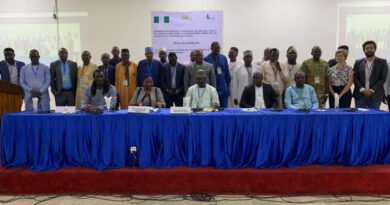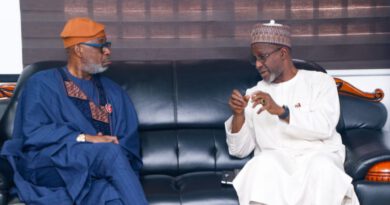National summit on justice: A promising journey – Dr.Muiz Banire
Between the 24th and 25th of April, 2024, legal luminaries gathered in Abuja to strategize on advancing the judiciary and the administration of justice in Nigeria. The summit aimed to enhance access to and the quality of justice for all Nigerians, regardless of their status, peculiarities or vulnerabilities. As of this date, undeniable apathy towards the administration of justice mechanisms in the country stems from a substantial lack of confidence in justice dispensation in the country.
This sentiment is linked to inordinate delays in justice delivery, the quality of arbiters and the process of their selection. Such a loss of confidence in the justice system risks degenerating the country into a state where self-help becomes increasingly prevalent. The summit, therefore, aimed to curb this drift towards anarchy.
The event was officially opened by the Vice President of the Federal Republic of Nigeria, Kashim Shetima, GCON, on behalf of President Bola Ahmed Tinubu, GCFR, who could not attend due to other state exigencies. Notable attendees included the President of the Senate, Godswill Akpabio, CFR, and the Chief Justice of Nigeria, Honorable Justice Olukayode Ariwoola, GCON. As the chief host, Prince Lateef Fagbemi, SAN, the chief law officer of the federation, was present throughout the discussions. The attendance of these dignitaries, representing all three branches of government—the Executive, the Legislature, and the Judiciary—highlights the summit’s significance and suggests a serious commitment to reform. This summit was unique as it was convened by the chief law officer of the federation, the office of the Attorney General, and the Nigerian Bar Association (NBA), thus bringing together all relevant stakeholders in the administration of justice.
The summit showcased the crème de la crème of the country’s justice sector. This early buy-in from critical stakeholders meant there was no need to lobby other parties post-summit. The discussions covered various thematic areas, including judicial independence and administration, judicial appointments and removals, access to justice and fair hearing, judicial remuneration and pensions, and election tribunals. The discussions primarily focused on the constitutional reform proposals previously submitted by the NBA to the National Assembly, along with other justice sector reform bills from various sources. Many progressive consensuses reached at the summit are expected to lead to significant improvements in the administration of justice in Nigeria. Before the detailed working sessions, the draft National Policy on Justice 2024-2029 was adopted.
This article cannot exhaust all the critical resolutions passed at the summit, but it will highlight some key reforms relevant and key to the administration of justice. One major area of focus was the proposal to amend the constitutional process for appointing and promoting judicial officers. Currently, the executive at both the state and federal levels, plays significant roles in these appointments, which many perceive as excessive executive influence. The new resolution and the draft bill suggest removing the executive from this process, leaving it to the legislature to finalize these appointments. This change aims to minimize political interference. Additionally, it is proposed that the appointment process be diversified, allowing competent legal practitioners from various backgrounds, including academia, legal practice and the corporate sector, to be considered for judicial roles. This approach would also involve publicizing the names of shortlisted candidates to ensure the utmost integrity in the selection process. In addition to the above is the critical need to legislate the guidelines and criteria for eligibility.
Another resolution was to restructure the composition of the Federal Judicial Service Commission and its state equivalents to reduce conflicts of interest. The proposal suggests that the roles of those who serve on this Commission should not overlap with those on the National Judicial Council. The current practice, where key judicial figures like the Chief Justice of Nigeria, the President of the Court of Appeal, the President of the Industrial Court and the Chief Judge of the Federal High Court serve on both bodies, was criticized. The alternative proposed is to limit the Commission’s role to managing the administrative affairs of judiciary staff, not judicial officers, with the National Judicial Council taking over full responsibility for judicial appointments.
The summit also called for more transparency in judicial appointments and discipline. It proposed legislative measures to remove the discretionary powers of executives at various levels to enforce judicial council recommendations, particularly in terms of sanctions against judicial officers. Furthermore, the exclusion of Bar members from the disciplinary processes of the National Judicial Council was suggested to be revoked, allowing broader participation in these matters.
Additional agreements were made to formally incorporate provisions for virtual or remote hearings into the Constitution, ensuring clarity and acceptance of such practices nationwide. It was also resolved to amend the Constitution to allow all superior courts the automatic authority to transfer cases, aiming to reduce delays caused by jurisdictional issues. The current pre-action notice requirement, seen as a barrier to justice, would be modified to allow exceptions in urgent cases. The tenure of heads of courts is proposed to be limited to a maximum of five years, with provisions for retired judicial officers’ pensions to match the earnings of active officers, thus amending the current constitutional provisions that limit such pensions. The summit also agreed that leave to appeal be only grantable by the appellate court hearing the appeal. Part of the outcome is to constitutionally entrenched entitlement to verbatim recording and judge’s notes as a further way of guaranteeing fair hearing. There was also concurrence on the professionalization of the administration of the courts. Finally, the draft bill on the administration of civil justice, already enacted by Delta and Ekiti States was recommended to other States, as well as the Practice Directions on Garnishee proceedings.
In conclusion, these proposed reforms represent a significant shift toward a more transparent, inclusive and efficient judiciary in Nigeria. The broad participation of stakeholders at the summit from different branches of government and various levels of the judiciary ensures that the proposed changes have substantial support for effective implementation. Looking ahead, the challenge lies in the enforcement and adoption of these reforms. It is essential for all sectors involved to maintain the momentum generated by the summit. This requires a continuous effort from the government, the judiciary and the civil society to uphold the commitments made.
Regular reviews and adjustments, based on real-world impacts, will be crucial to refining the reforms and ensuring they meet their intended goals. Moreover, public awareness and involvement are critical to sustain pressure on all parties to adhere to the reforms and to foster an environment where the public can hold them accountable. This can be achieved through ongoing dialogue, transparency in the reform process and education about the changes and their benefits to the general populace. Thus the National Summit on Justice has laid a promising path for the overhaul of Nigeria’s judicial system. It is now up to the stakeholders to carry forward the torch of reform with dedication and vigilance, ensuring that the vision of a fair, efficient, and accessible justice system becomes a reality for all Nigerians. This commitment to action will not only bolster the rule of law but also restore public trust in the judicial system, which is fundamental to the democratic fabric of the nation. As the summit’s outcomes begin to take shape, it is crucial that every participant and stakeholder remains engaged and proactive, pushing for the swift and thorough implementation of the agreed-upon measures. The journey that began at the National Summit on Justice is indeed promising. With steadfast dedication and collaborative effort, the path laid by this summit can lead to a transformative era for justice in Nigeria, characterized by integrity, fairness, and an unwavering commitment to the principles of democracy.
The onus is now on everyone involved—lawmakers, legal practitioners, government officials, and the citizens themselves—to ensure that this promise is fulfilled, thus strengthening the nation’s judiciary as a beacon of justice and a pillar of civil society. Continuing to maintain this commitment will require not only the effective implementation of the reforms but also an adaptive approach to the evolving needs of the justice system. This adaptability will be key to addressing unforeseen challenges and opportunities that arise as the landscape of Nigerian law and society changes. Regular stakeholder meetings, possibly in the format of annual or biennial reviews, could provide necessary feedback loops to monitor the effectiveness of the implemented changes and make necessary adjustments. The educational aspect should not be overlooked. A comprehensive public education campaign will be crucial to enhance the public’s understanding of the reforms and their impact.
This will empower citizens to engage more effectively with the justice system and assert their rights, thereby fostering a culture of legal awareness and active citizenship. Additionally, the success of these reforms will depend on creating a robust framework for accountability where both successes and failures are transparently reported. Such transparency will not only build trust but also promote a culture of integrity within the judiciary and beyond. Ultimately, the vision for a reformed judiciary in Nigeria is one where justice is not only administered fairly and promptly but is also perceived to be done so by all Nigerians. Achieving this vision will go a long way in reinforcing the rule of law and strengthening the democratic governance structure of Nigeria. As this transformative journey continues, it is essential for all involved to remain vigilant and proactive. The stakes are high, as the integrity and efficiency of the judiciary are fundamental to the protection of human rights and the smooth functioning of a democratic society. The collective effort and dedication of all stakeholders will be the key to turning the promising path laid out by the National Summit on Justice into a reality, securing a just and equitable future for all Nigerians. Further strengthening the judicial infrastructure is essential to support the reforms effectively. This includes improving court facilities, enhancing digital capabilities for case management, and ensuring that judicial officers and staff are well-trained to handle the new systems and processes. Investment in technology, such as digital filing systems and virtual courtrooms, will not only increase efficiency but also improve accessibility for citizens, making justice more attainable. In addition to infrastructure, the nurturing of a judicial culture that values ethics, accountability, and transparency is vital. Regular training programs focusing on ethical decision-making and the management of biases should be mandatory for all levels of the judiciary. This cultural shift can be supported by a strong framework for evaluating judicial performance, including peer reviews and public feedback mechanisms, to ensure that judges and court staff are held to the highest standards of conduct. Finally, the long-term sustainability of judicial reforms requires the commitment of successive administrations to continue the policies and practices that have been established. Political will is crucial, as changes in leadership can often lead to shifts in priorities. Ensuring that judicial reform is seen as a national priority, above partisan politics, is essential for its continued success and development. The path forward for Nigeria’s judicial system is indeed filled with challenges, but with persistent effort and collaboration across all sectors of society, the promise of a fair, efficient, and accessible judiciary is within reach. The National Summit on Justice has set the foundation for these transformative changes, and it is now up to all stakeholders to carry this vision forward, ensuring that justice in Nigeria is truly just for everyone.




